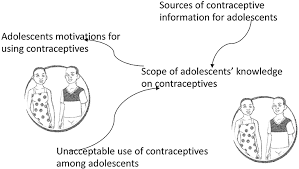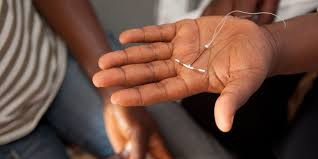PLAN B AND THE 25 OTHER LETTERS || MYRA TRUDEA OKUMU
By Myra Trudea Okumu
Many people do not understand contraceptives, how to use them, and more importantly when to use them. High fertility rates and of course, poor (lack of) conversation on birth controls especially to adolescent girls has led to an increase in teen pregnancies and unsafe abortions (topic for another glorious day).In Malawi, adolescent fertility rates are high and estimated at 136 out of 1000 births.
Alarming statistics. In Malawi, 50% of adolescent girls and young women have had their first child by age 19 and 45% report their pregnancies as unintended or mistimed. Yet, uptake of contraception remains low. Taking contraceptives is shameful in Malawi among adolescents because sex is taboo and so much misinformation revolves around contraceptives. The lack of open conversation between girls and the people around them (parents, teachers, and family members) leaves room for external conspiracies that result in teen pregnancies and contracting Sexually Transmitted Diseases and/or Infections. The best one can do is abstain from sexual activities but how many really do abstain? That's plan A in the mud. Condom is next on our list, the barrier method. Protects you from STI/Ds and prevents pregnancy when used correctly. Lowers the chances of you catching (or throwing) anything.
People date for 2 months and suddenly, the condom is discarded because of trust, right? Hilarious but let me go on. In relationships these days, a full blood screen is overlooked because people feel they can trust their partners, to be honest, to be careful, to be responsible, and to listen. Why would s/he lie about their health status? Why wouldn't there be full disclosure before the deed? If you ask me, if it can breathe and utter words, it can lie but that's just my opinion.
Condoms are like math, you have to do it but nobody really likes it.
This is the part where I tell you about all the STI/Ds you could get from not using a condom but I will pass and just tape the links at the bottom. The bottom line is condoms will save you half the trouble most contraceptive methods come with, some are invasive and the rest come with side effects. I will not be advocating for any brand here but take a pick from your nearest drug store.
Plan B. The morning-after pill. 72 hours. Emergency pills. Say this to a pharmacist and I promise you the side-eye. Plan B is for emergencies but the emergency at the beginning of the 'emergency contraceptive pill' is widely ignored. In more recent years, the morning-after pill has been (by many) considered a form of birth control or contraceptive method to use regularly or a better substitute for existing contraceptive methods.
Okay, say the deed has been done, you didn't use a condom, you aren't on any birth controls, and looking at the time of the month, you will be buying diapers by December latest. What are your options? Pray and hope you see your period in the next two weeks or visit a pharmacy and get yourself a Plan B? Plan B should do it and you see your period and let out a breath of relief. Using the morning-after pill becomes a pattern, a habit, a regular escape from parenthood (taking the morning pills like a hospital prescription for Herpes) but what exactly is the cost for what seems like the easy way out?
Side effects of Plan B
I went around asking sexually active adolescent girls if they have ever used the pill and a good good number of them have. When asked how many times they have used this 'emergency' method, I quickly found out emergencies happen every day, and every sex session warrants an emergency at the end.
While some reported minor side effects such as nausea, acne, breast pain, mood swings, dizziness, fatigue, and headaches, some reported having prolonged periods (up to 4 times in a single month), reduced/increased number of menstruating days per cycle, more painful periods (severe cramps), abnormally heavy periods, breast milk production with no baby in sight and enlarged breasts. One person even reported having recurring Candida infection for 3 months and was saved by over-the-counter vaginal creams. Other side effects associated with abuse of emergency pills include inflammation and/or infection of the vagina, premenstrual syndrome, hair loss, vaginal dryness, hirsutism (growing hair where there is not supposed to be hair), pelvic pain, diarrhea, decrease in the frequency of menstruating (skipping months), insomnia, muscle spasm, visible water retention, and discharge of fluid from the cervix.
From my research, those are the least severe, the ones you can live with. I will give you 5 that will kill you and then we proceed, fair?
- inflammation of the large intestines and/or liver
- an ovarian cyst
- a stroke
- a heart attack
- cervical dysplasia
This all boils down to what we are putting out there; what information do we continue pumping out there? Are we talking about safe sex? Are we being open about the different ways to avoid early and intended pregnancies and diseases? Or do we sit back and hope they figure it out. People with active sex lives (especially those with raging hormones that are yet to learn to control) need to be informed on safe practices that do not jeopardize their health, they need to be told that some random idiot will probably walk up to them and ask to only put in his tip. Or some small-minded boy will tell them to jump to get the sperm out. Fine although it is not true, does it get gonorrhea and/or syphilis out too? I think not.
Well darlings, here are the pros and cons of what I (personally) feel are the safest and the most ideal contraceptive methods to use especially if you are a young adult with their whole life ahead of you and would like to (for now) curve feeding offspring and/or do not want to subject themselves to lifelong drugs. Darlings, herpes has no cure.
IUD
IUD stands for Intrauterine Device. It is a small flexible plastic shaped like a T that is basically placed inside your uterus.
Pros: no chemicals, long term, prevent pregnancy, low maintenance
cons: a doctor has to insert it, doesn't protect against STDs, heavier flow (sometimes)
Implant
A contraceptive implant is a flexible plastic rod about the size of a matchstick that is placed under the skin of the upper arm. It releases a low, steady dose of a progestational hormone to thicken cervical mucus and thin the lining of the uterus.
pros: low maintenance, appropriate for people who cant use controls that contain estrogen, long term
cons: headache, breast pain, nausea, weight gain, no protection from STDs
I have spent what seems like the whole post ranting about how bad Plan B is. All I am trying to say s use it for emergencies, not as a medical prescription for contraception. Emergency pills should be used in the following scenarios:
Cultural factors that can influence family planning discussions and decisions include gender role inequality, deference to family or physician authority, religious influences, belief that the use of contraception implies sexual promiscuity, difficulties in discussing sexual health issues, attitudes toward monthly menstruation, and beliefs about decision making autonomy.
Thank you for coming to my Ted talk. Don't forget to like, comment and share.
Here are the links to a bunch of websites you can browse to learn more about contraceptives and all those other beautiful things that will save you an early baby shower. Love from your microbiologist turned blogger.
https://www.familyplanning.org.nz/advice/contraception/contraception-methods
https://www.webmd.com/sex/birth-control/best-effective-birth-control
https://www.everydayhealth.com/sexual-health/birth-control/myths-about-birth-control.aspx
https://www.betterhealth.vic.gov.au/health/healthyliving/myths-and-facts-contraception









Talking about issues we don't really talk about... Nice bringing it out in the open.
ReplyDeleteThank you darling
Delete